'I won't swim in water polluted with antibiotics'
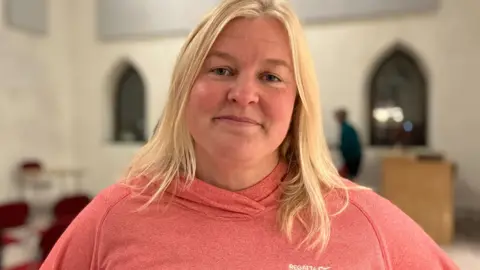 BBC
BBCThousands of people will march on London on Sunday at a family-friendly rally to highlight the importance of clean water in their lives. The BBC spoke to residents near one rural waterway, which scientists found had the second highest levels of active pharmaceutical pollution in the UK.
"You'd think as a country we would be able to look after our most pristine landscapes," says cold water swimmer Jo Broughton.
Ms Broughton has not dipped even a toe in Tideswell Brook, in the heart of the Peak District National Park, since August.
One of the reasons lies in the findings of a study that discovered the brook had the second highest levels of active pharmaceutical pollution in the UK, with drugs such as antidepressants and antibiotics detected in the water.
The research study, published in August by Prof Alistair Boxall at the University of York and the Rivers Trust, found concentrations of pharmaceuticals recorded at Tideswell Brook were at levels of concern for both human and ecological health.
One possible cause, according to Prof Boxall, was a higher average age, with the older population using and flushing more medications.
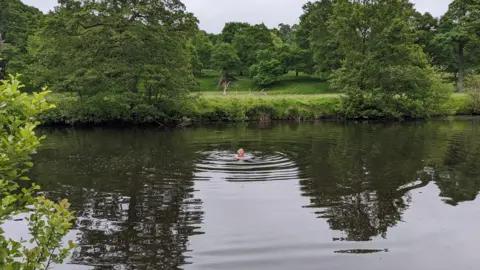 Jo Broughton
Jo BroughtonMs Broughton, 44, has not been swimming there since finding out, concerned about developing antibiotic resistance and the risk to her health.
"Going in the water is exposing me to antibiotics, antidepressants and other medication I haven't opted to take," she added.
The Tideswell & District Environment Group held an open meeting for locals to express both concern and anger at the pollution in their local brook.
"It horrifies me to think that this stream is more badly polluted now than when we first came here 27 years ago," says Lyn Crowe, chairwoman of the group.
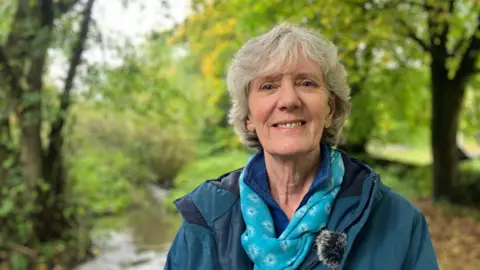
Jill Turner, a local resident and open water swimmer, said: "When we found out about the antidepressants, we laughed about it at first because you do feel really chilled out when you go cold water swimming!
"But what the hell is it doing in our rivers?"
The brook is a site of special scientific interest, meaning it is recognised as important for key species to breed and the larger wildlife ecosystem.
The study found 31 active pharmaceutical ingredients (APIs) at 52 of 54 sampling locations across England's 10 protected national parks during tests in the winter and summer of 2022.
APIs are drugs that are biologically active and can end up in our rivers when humans flush medication down the toilet, or when our bodies excrete them after use.
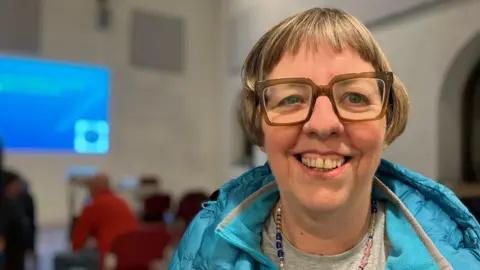
Prof Boxall said: "We found the highest concentrations of pollutants in areas we're trying to protect ecologically. That, to me, is a bit daft."
Tideswell Brook tested for concentrations of active pharmaceutical ingredients higher than those previously recorded in large cities, including London.
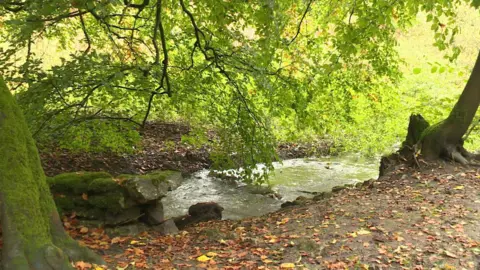
Prof Boxall says this may be down to several reasons:
- The low flow of water in national parks means less dilution of the concentrated pharmaceuticals
- A higher average age, with the older population using and flushing more medications
- Large numbers of tourists contributing to local sewage quantities
- Lack of infrastructure to remove pharmaceuticals from sewage and water companies using overflows more frequently
The march in London on Sunday, organised by the campaign charity River Action, will urge authorities to take action against the people and companies polluting rivers, lakes and seas.
What is being done?
An Environment Agency spokesperson said it was working closely with other regulators and the water industry to better understand how pharmaceutical compounds enter the water environment.
"We have developed an early warning system to identify contaminants of emerging concern to ensure any potential risks to surface waters, groundwater and soils are considered," they said.
"We are also collaborating with the pharmaceuticals and veterinary medicines industry via a UK cross-government platform for exchanging knowledge on pharmaceuticals in the environment."
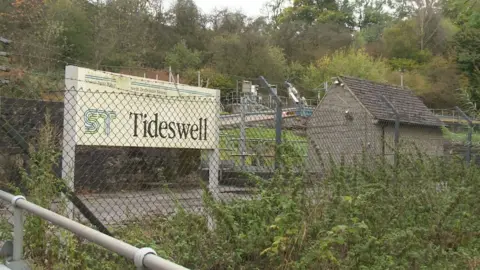
Severn Trent Water said no sewage treatment site in England was currently specifically designed to treat for pharmaceuticals.
It said its Tideswell sewage works carried out secondary treatment - which removes harmful bacteria - and tertiary phosphate removal, and the process used was not "materially different from what you would see at much bigger sites".
A spokesperson for the Department for the Environment, Food and Rural Affairs said: "We have already announced a rapid review of the environmental improvement plan, which will include how best to manage chemicals."
Steve Reed, the secretary of state for environment, food and rural affairs, said: "I share the public's anger on this issue, and I am taking immediate steps to clean up our rivers, lakes and seas.
"That's why we are placing water companies under special measures through the Water Bill, which will strengthen regulation, including new powers to ban the payment of bonuses for polluting water bosses and bring criminal charges against persistent law breakers.
"Just last week, I launched the largest review of the water sector since privatisation to address long-term failings in the sector, attract investment to drive environmental improvements, and put our water sector on a sustainable footing."
Follow BBC Derby on Facebook, on X, or on Instagram. Send your story ideas to [email protected] or via WhatsApp on 0808 100 2210.
